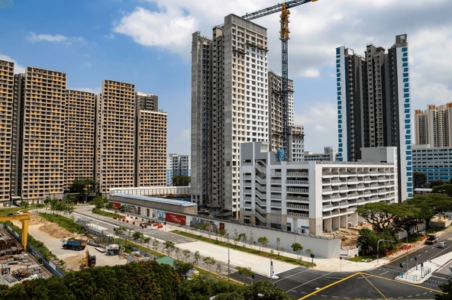To improve efficiency, new rules will penalize those who decline BTO flats, while new measures prioritize first-time applicants with urgent housing needs.
SINGAPORE: Starting in August, first-time applicants for Housing Board Build-to-Order (BTO) flats who fail to select a flat despite being successful in the balloting process will face stricter penalties, announced Minister for National Development Desmond Lee on Thursday (Mar 2). This move aims to improve the efficiency of flat allocation and help those with urgent housing needs secure homes more quickly, according to a joint statement from the Ministry of National Development (MND) and the Housing and Development Board (HDB).
Currently, around 40 percent of BTO applicants do not book a flat when invited, either by not showing up or declining the available options. Authorities noted that there could be several reasons behind this, such as unaffordable flat prices or preferences for specific flat features. However, Mr. Lee pointed out that this behavior ends up “crowding out other home buyers who have more pressing needs.”
Under the new policy, from August 2023, first-time applicants who give up their opportunity to select a flat will be placed in the second-time applicant category for the following year. Second-time applicants who accumulate one non-selection count (down from two) will face a one-year wait before being allowed to apply for a flat again.
The changes reflect the disparity in demand during BTO exercises. For instance, in the November 2022 BTO exercise, the number of second-time applicants for four-room flats in Tengah was significantly higher than first-time applicants, with 16.2 second-timers for every 1.9 first-timers.
To alleviate pressure on first-time applicants, new measures will provide additional ballot chances for those with children or married couples aged 40 and below, as part of the newly created First-Timer (Parents & Married Couples) category. These applicants will now have three ballot chances and will receive higher priority during BTO and Sale of Balance Flat (SBF) exercises.
HDB will also waive the non-selection count for applicants with fewer than 10 BTO flats or five SBF flats to choose from. This is to accommodate applicants who may have limited choices during their selection appointment.
Increased Priority for Families
As part of the continued push to support families in urgent need of housing, the First-Timer (Parents & Married Couples) category will give up to 40 percent of BTO flats and up to 60 percent of SBF flats priority to first-time families with children or married couples aged 40 and below. These families will also enjoy first priority for four-room or smaller flats in non-mature estates.
Mr. Lee emphasized that these measures aim to reduce the number of attempts needed for first-time families to secure a flat, particularly in non-mature estates, where demand tends to be lower.
In addition to the new priority measures, the government is raising the CPF Housing Grant for eligible first-time families and singles buying resale flats, which was announced during the Budget speech. However, Mr. Lee acknowledged concerns that this could lead to higher resale prices, but stated that the government had made this decision given the current market context and the aim of supporting first-time buyers.
More Affordable Housing Options
In response to the growing demand for affordable housing, the MND is also expanding its range of housing options. The third tranche of Community Care Apartments (CCAs) for seniors will be launched in Bedok, following the success of previous pilots. CCAs offer senior-friendly housing integrated with customizable care services, catering to the diverse needs of the elderly.
Moreover, the Joint Singles Scheme Operator-Run pilot will be expanded to new locations, including Bukit Panjang, Bidadari, and Sengkang, providing more affordable housing options for singles in public rental housing.
Refining the Housing System
Mr. Lee concluded by stating that the MND continues to refine the housing system over time, balancing fairness, efficiency, fiscal prudence, and responsiveness to demand. The new rules, including the introduction of additional ballot chances for certain first-timers and the increased flexibility for applicants facing limited choices, aim to further improve the system and ensure that those with the most pressing needs are prioritized.
The government is also mindful of the impact that the current market conditions have on applicants, particularly in terms of affordability, and will continue to monitor the housing landscape to make necessary adjustments.
“While the current system may not be perfect, it strikes a reasonable balance, and we will continue to adjust and calibrate as needed,” Mr. Lee said.








